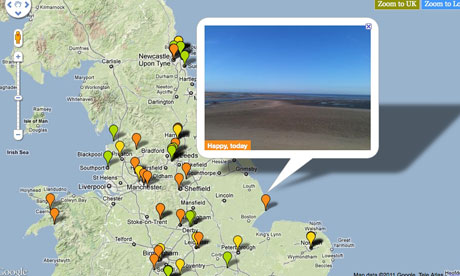
My name is David and I am a happychondriac. I've mellowed with age and would describe myself as content. But perhaps the feeling that you should be happier than you are is a disease that you can learn to manage, but not eradicate. So why would I use an iPhone app that records just where, when and how I've failed to be happy?
I have been using Mappiness for about six weeks. Developed by George MacKerron while doing a PhD in the department of geography at the London School of Economics, it gathers data on how our surroundings and activities affect happiness.
It asks you to rate how happy, relaxed and awake you are at random through the day. You slide the dials to the left or right depending on your state of mind, who you're with and what you're doing.
Then it allows you to view the data you've built up. The longer you've been using it, the more interesting this gets. You begin to realise that you really are an evening person, and that you just can't get enough of Thursdays. For a while I was happiest drinking alcohol. Now, oddly, it's waiting or queueing.
The app has harvested data from just under 3m responses (there are 45,000 users). Some of it's predictable: it won't come as a shock to readers of John Betjeman to learn that Slough is the unhappiest local authority area. The coast apparently makes people very happy and green places more than urban areas. An "intimacy, making love" category was added following requests – it's by some margin the happiest activity .
Once I'd got over the initial excitement – answering questions about myself is something I do quite like – I began to resent Mappiness. It never seemed to ping me when I wanted. It would happen when I was sitting in front of my computer at work, as opposed to, say, abseiling or riding a horse through the surf. I worried that I would seem miserable. And then there's my innate cautiousness. I might be feeling quite pleased with myself. But was I really "happy"? That's a bit much, isn't it? I would nudge the slider a tiny amount to the right. Often I would just tap it so it stayed pretty much in the middle.
It seems that, day to day, I don't experience a huge range of emotion. I'm mostly, well, not too bad. But does this matter, I ask philosopher John Gray. "There is the idea that a life is failed if the person who's lived that life doesn't feel it to be happy," he says. "It's come to be felt that happiness is a sensation or a mood. If you go back through history, not just philosophers but novelists, essayists, Montaigne for example, they didn't think that a happy human life was one that necessarily excluded periods of distress or moods of despondency. If you think of happiness as a sensation then you're focusing on a momentary state, rather than applying the idea of happiness to a life as a whole."
Surely that's not to say that unhappiness is something we should always sit back and accept? "I don't think a feeling of being trapped in misery can be good for anybody. But once you're out of that situation, what you seek might not be a position in the world in which you never suffer unhappiness, it might be the most meaningful life, or the most exciting one." Fair enough. "The etymology of happiness is, I think, based on "hap" – chance or accident. You're probably capable of being happy in a much wider range of lives than you think."
The best thing about this whole exercise is the map of Britain on to which users have uploaded the images they're asked to capture when feeling particularly happy. The result is an illustration of just how idiosyncratic happiness can be: pictures include a cat on the bed, a canal, the inside of a bar. Looking at them, happychondria's grip loosens. I might be miserable on the holiday of a lifetime, but the sight of a fox in the dark or a privately remembered joke are the things that will really make me smile.

